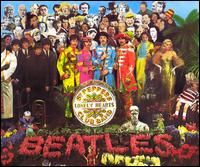The apotheosis of rock

Sgt. Pepper's Lonely Hearts Club Band - 1967
The Beatles took four months, 700 hours and $100,000 to conceive what was...and still is the standard to which all rock recordings are compared. If you're not familiar with it and you're thinking, "What's this special about this Beatles album, 30 years after it was released? No one listens to 'them' anymore!" But if you dismiss it just because it's 'old', you're missing a classic, an album that has been described by the Rock and Roll Hall of Fame as 'the apotheosis of rock'.
At the time of its release in 1967, it immediately changed the idea of what a rock band could achieve, not only in the rock community but also in the mainstream, which had previously dismissed the genre as child's play. Rock music before this was little more than an excuse for musicians to let their larynx loose and their hair down. Sgt. Pepper's however took rock music to the next plane, taking it from the frivolity of its early years to an incredible fusion of musical expression, drawing from R'n'R and R&B, from Dylan and the poets, from thoughts and music from India. Challenging reason and warming the heart, it contained songs that would be forever fresh and would set the standards for newcomers to compare themselves. The title track, in which the Beatles pose as the fictional Sgt. Pepper's Lonely Hearts Club Band and invite you to 'sit back and let the evening flow' is a perfect example of the Lennon/McCartney duo's ability to combine their radically different styles of music - Lennon being the essential rocker, McCartney the more melodic tunesmith. McCartney somewhat dominates the album in terms of compositions (Getting Better, Fixing a Hole, She's Leaving Home, When I'm Sixty-four, Lovely Rita, and the title track) and he sets the tone for the album. His earlier works were more light-hearted and somewhat trite, but in Sgt. Pepper's his sense of rhythm and devious arrangements come to the fore. George Harrison's sitar also finds space in this album with the track Within you, without you which combines the strains of rock with Indian classical music! Lennon's contributions however, are few and far between, but a few of his gems are evident. With a Little Help from My Friends (the theme song for The Wonder Years was based on this song) is a friendly, bluesy pop song that hides some genuine Lennon anguish, a la Help! The notorious Lucy in the Sky with Diamonds remains one of the touchstones of psychedelia, thanks to its inventive arrangement. The title of the song, which has lent itself to much speculation was actually based on a drawing by his young son Julian. Lennon is also the mastermind behind most of A Day in the Life, the song that brought a monumental close to an
already stunning album and the centerpiece of Sgt. Pepper's... A haunting number that skillfully blends Lennon's verse and
chorus with McCartney's bridge, A Day in the Life is surely one of their greatest recorded musical achievements ever, the
orchestral crescendos alternating with the compelling piano chords, a perfect example of his genius.
It is possible that first-time listeners may find Sgt. Pepper's a little disappointing, in the light of its reputation and
years of being force-fed hype that claims it is the greatest album of all time. They may find it quaint or antiquated, rather
than charming, and its few flaws may stand out larger due to the hype. After all, they have grown accustomed to the
innovations that were pioneered here. However there are no albums quite as historically important as this. After Sgt.
Pepper's..., there were no longer any rules to follow, no clear boundaries of genre - rock and pop bands could try anything,
for better or worse.
Ironically, few ever tried to achieve the sweeping, all-encompassing embrace of music as the Beatles did here. Don't
dismiss this album because of it's age...because if you do, you're not missing out on a rock band, you're missing out on a
20th century phenomenon. The Beatles don't just represent an era of music, their music is timeless - they represent a genre,
one which they defined themselves. They represent, in the words of Derek Taylor "the 20th century's greatest romance".